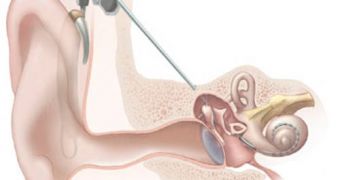Devices such as cochlear implants and auditive prosthetics improve the auditory performance of the near-deaf or the hard-of-hearing, but experts have known for a long time that they only work correctly in quiet environments such as a small room, a not that much so as soon as the level of background noise starts to increase. To address these types of situations, experts at the Tel Aviv University, led by professor Miriam Furst-Yust, have recently developed a new algorithm for these prosthetics, which they say reduces background noise by as much as 50 percent.
The sound engineers reveal that their new system works by identifying the sounds that are irrelevant to a discussion, and suppressing their frequency, at the same time allowing for clean voices and music to pass through, amplifying these signals. In preliminary experiments, the team behind the innovation was able to determine that patients experienced a 50 percent improvement when trying out the devices outfitted with the new algorithm, as opposed to basic ones available on the market.
“Hearing-impaired people have a real problem understanding speech. Their devices may be useful in a quiet room, but once the background noise levels ramp up, the devices become less useful. Our algorithm helps filter out irrelevant noise so they can better understand the voices of their friends and family,” explains professor Furst-Yust. An amazing feat of the new algorithms is that they can be applied on existing devices as well, and the procedure is as simple as uploading new software on a computer.
“We've developed a mathematical model of the ear that shows how speech recognition works. The math is complicated, but basically we're cleaning auditory information before it goes to the brain. We get rid of some of the information – the background noise – so that the hearing-impaired have an easier time 'filling in' missing information that their ears can't give them. It takes some getting used to, but people who have been wearing hearing aids all their lives have no problem getting the most from Clearcall. And we can train the newly hearing impaired in a quick introductory session,” the expert adds.

 14 DAY TRIAL //
14 DAY TRIAL //